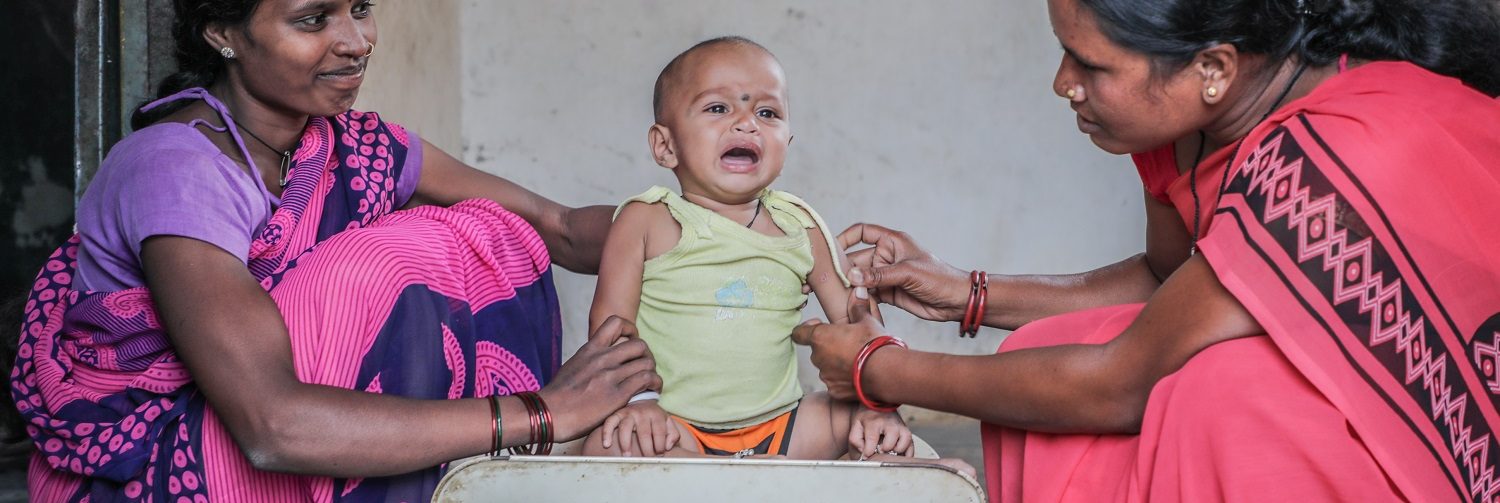 The One Full Meal (OFM) program aims to improve maternal nutrition and health across India by bundling center-based hot-cooked meals (HCM) for pregnant and lactating women with other nutrition services and behavior change communication implemented through the Integrated Child Development Services (ICDS) scheme. Since 2013, the program is being delivered through anganwadi centers (AWCs) in eight Indian states—Andhra Pradesh, Chhattisgarh, Gujarat, Karnataka, Maharashtra, Telangana, Madhya Pradesh, and Uttar Pradesh—yet, there is limited consolidated insight on its effectiveness or on lessons for implementation.
The One Full Meal (OFM) program aims to improve maternal nutrition and health across India by bundling center-based hot-cooked meals (HCM) for pregnant and lactating women with other nutrition services and behavior change communication implemented through the Integrated Child Development Services (ICDS) scheme. Since 2013, the program is being delivered through anganwadi centers (AWCs) in eight Indian states—Andhra Pradesh, Chhattisgarh, Gujarat, Karnataka, Maharashtra, Telangana, Madhya Pradesh, and Uttar Pradesh—yet, there is limited consolidated insight on its effectiveness or on lessons for implementation.
Together with several partners, therefore, we examined the available evidence on the OFM program using a combination of approaches. These included a desk review of available program documentation, joint development of program impact pathways, an evidence review, and a stakeholder consultation. .
Read this report to learn more about the evidence and implementation insights on the OFM program, also summarized below.
Implementation Insights
We find that the OFM program objectives are broad and vary across states. In some states the objectives pertain to achieving proximal outcomes such as improving coverage of services and practices such as maternal dietary adequacy and improving birth weight. In others, objectives pertain to improving distal outcomes such as mortality rates. There are several similarities in the program models adopted by most states. The OFM program model typically consists of a mid-day meal—providing 40 percent of recommended dietary allowance—as per the National Food Security Act (NFSA) for women at the AWC. All states provided the HCM for six days a week, providing from 900 kcals (Chhattisgarh, Maharashtra and Uttar Pradesh) to 1200 kcals (Andhra Pradesh and Telangana). The costs range from Indian rupees (INR) 8.75 to INR 24.00 per meal. In addition, the model aims to include daily administration of iron and folic acid (IFA) and calcium, routine deworming, monitoring of gestational weight gain, monitoring of infant weight and height measurements, and health and nutrition counseling. In terms of roll-out processes, states either conducted a pilot and adopted a gradual scale-up model, or decided to roll out the scheme to all eligible beneficiaries.
Evidence on Program Impact Pathways
Using the available program documentation and consultations, we identified three potential pathways to impact of the OFM program: (1) the food pathway; (2) the health and nutrition services pathway; and (3) the group-based behavior change pathway (see Figure 1 in the report). Most of the available evidence, however, is on the food pathway, which indicates that women regularly consume the hot meals at the AWCs. Only one study examined the health and nutrition services pathway, reporting low consumption of IFA along with HCM, and one study examined the group-based behavior change pathway, reporting gaps in counseling of women. Overall, evidence along the pathways was limited.
Figure 1. Proposed pathways to nutrition impact

Source: IFPRI analysis.
Note: AWC = Anganwadi center; AWW = Anganwadi worker; IFA = Iron and folic acid; HCM = Hot-cooked meal; OFM = One Full Meal.
Takeaways
The review indicates that the OFM program could be used as an effective platform for delivering a combination of services to pregnant women, which are essential both for fetal growth and the maternal health. However, improving program implementation and uptake will require attention to a range of already identified factors related to the food pathway, such as infrastructure, staffing, food supplies and demand creation. In addition, given limited insights on the other pathways, more attention is needed to build implementation insights and evidence to ensure adequate implementation and uptake of the health services and behavior change pathways.
Further implementation research on the OFM program will help to identify other program areas that need further strengthening, and to assess the impact of making program refinements to address those challenges. A thoughtful implementation research agenda, accompanied by routine learning engagements among implementers and researchers, can strengthen insights on the program. Stronger evidence on the range of potential benefits and cost-effectiveness can also provide a basis to fast-track program success and sustain investments in the program.


